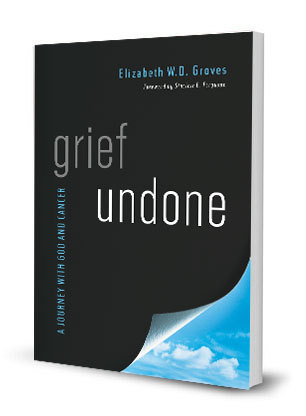The following is an excerpt from Grief Undone, written by Elizabeth W. D. Groves, an instructor in Hebrew at Westminster Theological Seminary, about her family’s experience with her husband, Al’s, terminal cancer. Al Groves was a longtime professor at Westminster. Grief Undone: A Journey with God and Cancer © 2015 by Elizabeth W. D. Groves. Used by permission of New Growth Press. Excerpt may not be reproduced without the express written permission of New Growth Press.
The day Al died, laboring to breathe hour after hour, we wondered why the Lord waited so long to take him after his battle with cancer. I don’t mean that we railed against his judgment or questioned his wisdom; I think the Lord granted us all peace to trust that he knew what he was doing and that he was doing it in love. But we were curious as to what purpose was being served by making Al wait so long.
In the next week I began to discern an answer. I think it was for us.
 We had such a wonderful time with Al during his last week that once he lost consciousness, we longed for him to be free. For 10 hours on that Monday as he labored to breathe, every one of us ached for him to be released. That was all we yearned for hour after hour.
We had such a wonderful time with Al during his last week that once he lost consciousness, we longed for him to be free. For 10 hours on that Monday as he labored to breathe, every one of us ached for him to be released. That was all we yearned for hour after hour.
When you have to wait for something you really want with all your heart, whether it’s getting your first bicycle or having children after struggling with infertility, receiving that desire is an exquisite joy. Because we had to wait with increasing longing for Al’s release, any other emotions—like regret or wishing to prolong the time or to hang on—were burned away, and seeing Al finally set free was a moment of nothing but celebration. In the midst of such great sorrow at losing my husband and my children’s dad, what more wonderful gift than to see that moment transformed into joy?
The week after Al died, the memory of the moment of his passing was so precious. Knowing that we had all the chances we needed to say goodbye, and knowing that we would not have wanted it to last any longer, brought such peace to our hearts. The protracted time and the resultant joy we experienced at Al’s passing actually turned out to make the subsequent days easier.
I wouldn’t have anticipated that, but the Lord knew it. He asked Al to do one last thing for his family—to wait in the valley of the shadow of death for an extended period before being able to come out the other side into the glorious light of heaven. If it had been up to us, we would have chosen for the Lord to take Al quickly. If it had been up to Al, even though he was so eager to be with Jesus, he would have chosen to wait, if that would help us. Thankfully, it was neither his choice nor ours, and the Lord knew best.
God’s choices are sometimes hard to figure out. Some we will never understand on this side of the grave. But sometimes we can see the wisdom in retrospect, and this was one of those times. We could actually see why what seemed like a bad thing (Al having to linger) was in fact a blessing (because our desire for his release made his passing a moment of joy rather than sorrow). We knew there would be times ahead when we might ask God why he gave Al only 54 years. It was good to have the reminder at that moment, tied right into Al’s death, that God’s ways and wisdom are far above ours. They are always best and always for our blessing.
Is there enough evidence for us to believe the Gospels?
 In an age of faith deconstruction and skepticism about the Bible’s authority, it’s common to hear claims that the Gospels are unreliable propaganda. And if the Gospels are shown to be historically unreliable, the whole foundation of Christianity begins to crumble.
In an age of faith deconstruction and skepticism about the Bible’s authority, it’s common to hear claims that the Gospels are unreliable propaganda. And if the Gospels are shown to be historically unreliable, the whole foundation of Christianity begins to crumble.






























